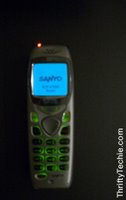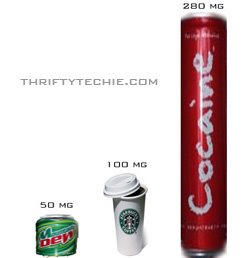Thursday, September 28, 2006
Monday, September 25, 2006
Techie Cred? Maybe not. Thrifty Cred? Definitely.


So you wanna know about my cred, huh? OK. Here's a run-down:
PORTABLES:
My phone is a Sanyo SCP-4700 from 2003. It packs a vintage teal electroluminescent lcd display, backlit buttons, a handy red led indicator (see pic) to warn me of voice mail. It has more than a dozen built-in ring tones (including hits like Pachelbel's Canon), speaker phone, etc. The features go on and on, really. The size is handy too. It's far more solid than your RAZR! It's pretty amazing to consider all this was free after I signed on with Sprint PCS.
My iPod is a 3G 10GB from 2003. Received as a graduation present, it's still going strong.
COMPUTERS:
My wife and I have two computers. A 12" iBook G4 800 Mhz/640 purchased new in the fall of 2003. We also have a 15" G4 iMac purchased used off of eBay in the fall of 2005.
HOME ENTERTAINMENT:
Still rockin' an Aiwa 3 disc, dual cassette shelf system. (For the kids out there, the dual cassette decks were for dubbing tapes...sort of like copying MP3 files) We've got a Cyberhome DVD player/burner and a 20" Panasonic CRT standard definition TV. No TiVo or DVR.
That's it! How does your set-up rate?
Friday, September 22, 2006
Starbucks Raises Prices, Australia supplies Cocaine

Any successful drug dealer knows to raise prices when demand is high. Accordingly, America's favorite drug lord Starbucks is raising their coffee prices citing mounting expenses involved in their trade. While Starbucks' professional-type patrons have deep pockets, Dunkin' Donuts is giving away coffee hoping to drum up demand in the 'hood, apparently.
Meanwhile a new player is delivering a high-quality product called Cocaine. In a not-so-subtle move, Cocaine is simply delivering more bang for the buck with 280mg of caffeine per serving (see graph above). In addition, Cocaine contains lots of vitamins and dextrose; probably to take the edge off the inevitable crash.
Here's a user's guide to America's favorite drug.
Thursday, September 21, 2006
CFL bulbs: A bright idea.

We hear about the environment a lot these days what with hybrid cars, global warming, and alternative energy sources regularly in the headlines. Often times thinking about the environment means making tough sacrifices such as spending thousands of extra dollars on a hybrid car in order to save gas, or sitting and listening to Al Gore drone on for 90 minutes about melting glaciers.
Sometimes being environmentally correct is very easy, however. That's what makes the compact fluorescent lightbulb (CFL) story so remarkable. It's the rare technology that's economical in every sense of the word, saving money, time, and electricity.
CFL technology has been around for years as an energy saving alternative to the "regular" incandescent lightbulbs. Despite using about 75% less energy than equivalent conventional bulbs and lasting ~8x as long, CFLs were "prohibitively expensive" for consumers, costing several dollars per bulb (compared to a buck for four regular bulbs). Thus, they weren't popular.
Today CFL bulbs still deliver energy savings but at much lower initial cost than in years past. Thanks in part to a push by Wal Mart these light bulbs are now much cheaper and should be used by everyone. Although these bulbs are still about 10 times more expensive than conventional bulbs (which is to say, just $2 or so) they are one of the best investments that everyone can make. The energy they save over just a few months of usage pays for the cost of the bulb. After that, it's all gravy. The bulbs last for many years which means no changing bulbs and no buying new bulbs. And over the lifetime of the bulb one could save about $40 worth of electricity. Good for the wallet and the environment.
Switching from conventional incandescent lightbulbs to CFLs may seem like a mundane action – frankly you may not even notice the $4 monthly savings on your electricity bill – but the energy savings can be enormous given that it is the type of action that everyone can take part in. 100 million CFLs used instead of regular bulbs would reduce green house gas emissions as much as taking a million cars off of the road.
Lightbulbs. So boring, yet so amazing. Next time somebody shows off their Prius or wants to make a movie about saving the spotted owl, tell 'em you've got a brighter idea: you're gonna go change a lightbulb!
update: feature CFL article in Fast Company.
Monday, September 18, 2006
What do you want?

There's a lot of great tech stuff that's in development. What things are you looking forward to? WiMax? WiFi calling? On-demand or downloadable TV content? RFID?
Maybe you're a dreamer and you want teleportation? Or maybe Microsoft Vista?
Hey, at least I'm asking. It's more than I can say for Sprint offering streaming movies on a cell phone for $4. Surely you have some better ideas?
Thursday, September 14, 2006
new iPods: analysis (September 12, 2006)

I've just finished digesting the Apple announcements from and I'm now ready to egest, so here it goes:
The iPod 5.5G w/ video and 2G nano were solid updates and were unsurprising. Apple made incremental, important improvements (+ screen brightness, + battery life, + storage capacity) and added search by alphabet functionality. There was no surprise in that Apple continues to add value to their iPod line incrementally while eschewing price drops, using engineering and brain power to prop up their revenues. Incidentally, the biggest surprise for me in their new iPod announcements was that they DID cut the price of the 30 GB iPod w/ video to $249. Meanwhile, he attention that Apple paid to developing their entry-level / ultra-portable shuffle proves that they are intent on canvasing the PMP market.
Pricing scheme:
iPod shuffle 1GB: $79 ($79 per GB)
iPod nano 2GB: $149 ($74.50 per GB)
iPod nano 4GB: $199 ($49.75 per GB)
iPod nano 8GB: $249 ($31.13 per GB)
iPod 5G 30GB: $249 ($8.30 per GB)
iPod 5G 80GB: $349 ($4.36 per GB)
Of course, all the new iPods look slick, but anyone that still dismisses the iPod as faddish or merely fashionable is missing the shrewd positioning of the current iPod line:
5.5G w/ video - the 80GB model may be more expensive than the upcoming microsoft Zune (can't tell because pricing hasn't been announced, and may have been disrupted by Apple's release) but trumps the Zune's 30GB capacity by quite a bit. Meanwhile the 30 GB iPod is the cheapest iPod ever and undercuts Zune's pricing. In short, the two new 5.5G iPods are Zune's rock and a hard place this holiday season.
iPod nano - best value for a small-sized mp3 player.
iPod shuffle - interesting because it's so cheap. It serves as an entry-level iPod. Also will sell to iPod and iPod nano owners because the sheer (lack of) size adds a lot of utility. Leave on in your car, or keep it on you despite the fact that you already have a PDA or phone that can also play music, excercise with it, etc.
Summary: iPod continues market leadership with class leading design, solid specs and value.
Monday, September 11, 2006
We can never forget 9/11/2001
Those events of 9/11 transcend tech issues, of course. But tech had a direct bearing on the events of that fateful day.
Thursday, September 07, 2006
Remote Backup
OK. Not the worst dream ever, but real-life remote backup options aren't exactly sweet dreams either. One could spend hours backing up stuff to CD or DVD and then mailing them to a friend or storing it at a bank or... something.
The alternative is online storage. Mac users get ONE gigabyte of storage for $100/year at .Mac or FOUR (4) gigabytes of storage for $200/ year. Xdrive.com will give you 5GB of remote storage for just $120 and backup.com will give you 5GB for $500.
It's a pretty hefty price to pay for such a little amount of storage. I could pay for 5GB of remote storage and it will be just enough space to save my (small) collection of digital photos. Meanwhile my music, documents, calendars, pets, etc. would all go up in flames or drown in a flood etc.
A FREE utility to turn your Gmail account into a 2.5 GB virtual remote hard drive can be had at rjonna.com. But again, it's a piddling amount of storage.
Does anyone have any suggestions for remote backup and storage solutions?

